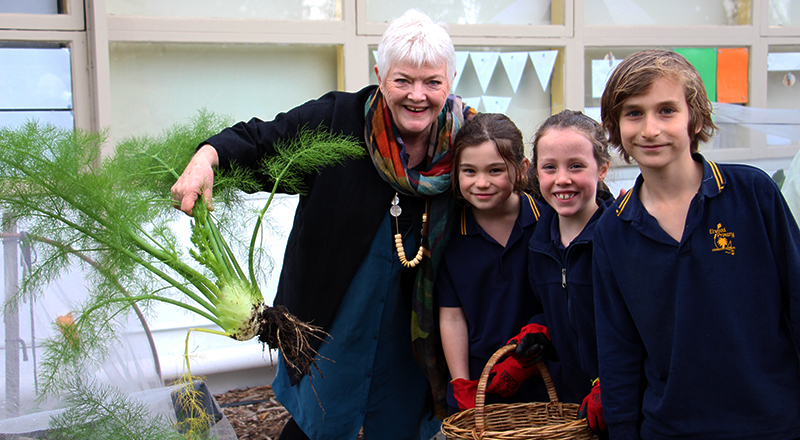Message from Stephanie Alexander for National Nutrition Week

To mark National Nutrition Week, Stephanie Alexander AO, founder of the Stephanie Alexander Kitchen Garden Foundation, shares her vision to help all Australian children form positive food habits for life …
In 2001 I decided to test my theory that if children could be introduced to the amazing world of growth and fresh food at an early age it would have a significant impact on their food habits for life.
Classes devoted to pleasurable food education with its mantra of ‘Growing, Harvesting, Preparing, Sharing’ started at Collingwood College in 2001. Fifteen years later the Stephanie Alexander Kitchen Garden Program is part of the school week in 830 schools across the country. In the last twelve months we have grown further by developing an online community known as the Kitchen Garden Classroom that is open to all schools, primary and secondary, government and independent, and, importantly, early years learning centres. An additional 350 educational centres have joined. The number grows every day.
Food education is becoming globally acknowledged as vitally important for all young children from their earliest years onwards. Those of us leading campaigns know that most habits are established very early in life, and that includes attitudes towards food.
Our work has been positively evaluated by universities and has been acknowledged as revolutionary and life-changing by parents and principals. Our team has been funded by governments, philanthropists, corporates and individuals, and currently the Victorian Government and Principal partner Medibank. This level of support has enabled us to develop unequalled educational resources, and to offer support and training to all in our kitchen garden community, both face-to-face and online. Our schools and centres stretch from the far Kimberley to southern Tasmania, from Kalgoorlie to the Flinders Ranges, and include Indigenous communities, along with small and large suburban schools, regional schools and tiny rural schools, and many early learning centres.
It is heartening to see that our work has influenced others. Jamie Oliver, a longtime campaigner for improvements to the UK school food program, announced in May 2012 that he was creating a UK Kitchen Garden Project in November 2014 based on our initial model. Today I have read that Jamie Oliver's Kitchen Garden Project has formed a partnership with another important organisation, the UK Soil Association's Food for Life. Jamie’s present emphasis on education has developed from his important work to improve the standard of school lunches in the UK. His influence has been immense.
It is encouraging to know that this movement is spreading, led by strong spokespeople who can muster financial and public support. In the US Alice Waters is the visionary behind the successful Edible Schoolyard program at Martin Luther King school in Berkeley, California and the founder of the Edible Schoolyard Foundation. Subscribers to its weekly newsletter are kept informed of the many and varied food education initiatives appearing all over the US.
We hear on a daily basis from our Departments of Health, and various groups dedicated to improving the health of the population, that habits must change if we are to cope with the looming public health cost of poor diets and lack of exercise. And yet ongoing, large-scale, nationwide support for our program has not happened. It requires Departments of both Health and Education to work together and to acknowledge that early intervention is a most important part of the whole picture.
My dream is that all Australian governments encourage or even mandate that pleasurable food education should be included in the primary curriculum of every school in the country, taught by enthusiastic teachers who receive training in running a kitchen garden program as an integral part of their teacher training.
If this happens, we can change the way an entire generation of young Australians understand and make food choices. In addition to broadening the student’s understanding of flavor and freshness, we would be delivering an educational program that touches on every aspect of the school curriculum – science, literacy, numeracy, art and design, cultural understanding and food supply. And all this is done whilst the students have fun.
< Back to Latest News
